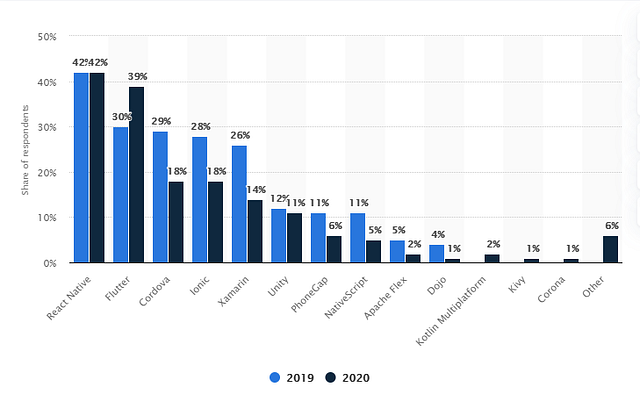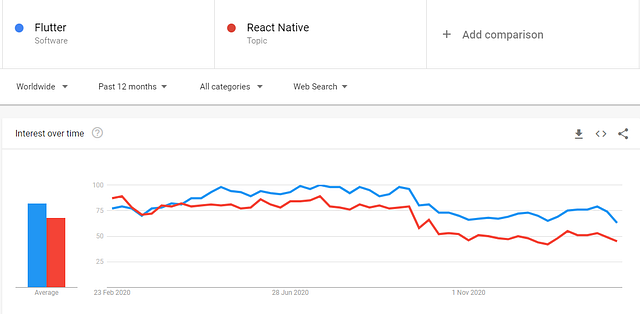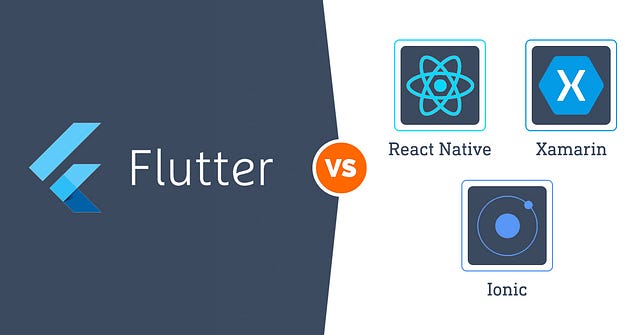With the advancement in technology, many organizations are choosing to create apps to promote their goods and services. They start by creating something for their Android audience and move to iOS after the success of the app, or vice-a-verse. Creating something from scratch again loses them a lot of money. Many developers suggest a hybrid mobile app development model as an alternative. You start by creating something on a common platform and use the code-shareability features to grow to another platform. With such technology, one can save a lot of time, effort, and create an app similar to the old version at a minimal cost. Flutter is one such favored choice amongst developers and businesses alike.
Highlights of the Content
- Flutter Numbers
- What is Flutter?
- Reasons Flutter Is The Future of Cross-Platform Development
- Why Should Mobile App Startups Choose Flutter?
- Flutter vs React Native
- Flutter vs Ionic
- Flutter vs Xamarin
- Flutter vs Other Cross-Platform Apps
- How Will Flutter Benefit Mobile Development in 2021?
- To Wrap It Up
- Frequently Asked Questions
In this post, we are going to talk about Flutter and how it is a breakthrough in technology and revolutionizing the way we create mobile applications. We will try to understand how it can be the future of cross-platform app development around the world. We will also compare different technologies to establish the prominence of Flutter. This will create a base for you to judge why Flutter is the best. We will also discuss whether Flutter is an SDK or a framework in this post.
Let us begin by looking at some numbers that will show you the effect of Flutter in the industry.
Flutter Numbers
- According to Statista, Flutter is the second most popular cross-platform mobile app development technology in the world. It came second only to React Native and still has over one-third of software developers using it in 2020.

- According to the report, over 39% of developers are likely to use Flutter for hybrid mobile app development in 2020 as compared to 30% in 2019. This is an unprecedented growth rate and will probably increase in the year 2021.
- According to Google Trends, there have been a lot of searches for Flutter as compared to React Native in the past 12 months. The world seems to be interested in Google Flutter more than its highest competition.

These numbers prove that Flutter is popular and is here to stay. To get a more detailed look at the statistics and why it is ideal for your app development, you can check out our blog:Top 10 Reasons Flutter Is Better For Your App Development.
Let us get back to learning more about Flutter and start exploring it further. We begin by answering the basic question on everyone’s mind:
What is Flutter?
It is the latest mobile UI application developed by Google in May 2017. It is open-source, free, and full of amazing designs and features. You can create beautiful mobile, web, and desktop applications using a single codebase. It is easy to learn and create a native mobile application with just one codebase. You just need to know a single programming language and a codebase to build two different apps for iOS and Android.
Here are the two major components of Flutter that will help you understand it better:
- SDK (Software Development Kit): It is a series of tools that can help a mobile developer create an application. It has the tools and means to translate a piece of code into the native machine language of an Android or an iOS device.
- A Framework: Flutter offers a UI library of elements like buttons, sliders, text boxes, etc. in the form of widgets. You can reuse the UI elements and customize each according to your needs.
Google has also developed a programming language named Dart to use with Flutter. It was first introduced in October 2011 and has been significantly improving in the last ten years. Hopefully, this is all the information you need to understand a bit about Flutter. Now, let us explore the reasons that we consider will make Flutter app development services the future of cross-platform app development.
Reasons Flutter Is The Future of Cross-Platform Development
There are many advantages of Flutter over other app development frameworks available in the market. It offers outstanding performance, flexibility, and an amazing community to back it up. To top it all up, the fantastic support of Google also puts the technology at the forefront of many of its competition. There is a lot of debate that considers Flutter the future of any cross-platform mobile app development project you can think of. Here are some reasons that make it stand out from its peers, making it that much more successful now and in the future.
1. Single Codebase
The ease of having not to do much while saving time and money is a significant advantage of Flutter. You can create web, desktop, Android, iOS applications by learning a single codebase. This way you can create something for multiple platforms and operating systems while reducing the total time to market.
2. Easy-To-Learn
Almost anyone can start learning and developing an application in no time using Flutter. Their documentation and tools for hybrid mobile app development are a favorite among many developers. They find it simple and easy to learn and adapt to their work environment.
3. Faster Development Time
Earlier developers used to code for each platform, i.e. Android or iOS one at a time. This cost a lot of time and effort for both entrepreneurs, designers, and developers. With Flutter, one can easily save a lot of development time while creating something beautiful and amazing.
4. Lots of Widgets
Flutter offers a library is full of widgets so that you don’t have to design something from scratch. You can customize each according to your requirement. All the widgets, plugins, tools, and packages are portable across platforms and layouts. You can use the same features in multiple OS and built a great mobile application.
5. Open Source Packages
The best thing about Flutter is that it is open-sourced and free. You can start creating without having to worry a lot about the cost of installing IDE into your system. You can choose from a plethora of options and easily integrate the desired functionality cost-effectively. The advantages mentioned here are just a few points that prove the effectiveness of Flutter. Let us look further into the advantages of choosing Flutter for startups and new mobile app developers.
Why Should Mobile App Startups Choose Flutter?
Hybrid mobile app development has a lot of advantages over Native mobile app development. Here are the many benefits of choosing Flutter, a cross-platform app development technology for your startup.
1. Ideal for MVP
When you are just starting in your project, you need a minimum viable product (or MVP) to share with your investors. Flutter can help you create an MVP that can show how the final product will look like in both the Android and iOS platforms. It is ideal for startups to choose Flutter to create their MVP.
2. Cost-Effectiveness
Startups usually are tight on their budget and look for economical solutions to create their apps. The best way is to hire Flutter app developers who can create a web, mobile, and desktop version of your business. You can save a lot on hiring professionals to create individual applications.
3. Create Cross-Platform Apps Easily
With Flutter, you can create something for different operating systems that have little or no compatibility with each other. This makes debugging and testing a lot easier. Thus, saving cost on additional infrastructure.
4. Common Code For Back-end and Front-end Development
Unlike native app coding, you can use a single language of Flutter- Dart to create both front-end and back-end. Thus, saving a startup a lot of investment in hiring professionals to build and maintain the application.
5. Beautiful Interfaces
Flutter offers a plethora of beautiful widgets that are compatible with both Android and iOS platforms. Developers can use them to create a great user interface. Each is highly customizable and saves a lot of time in development.
Now, let us compare the prowess of Flutter over other cross-platform development technologies in the industry.

Flutter vs React Native
As per the statistics above, React Native and Flutter are in close competition to steal the minds and attention of your developers. Both have been competing to establish themselves as a leading cross-platform mobile app development language. While Flutter is relatively new, it still can create a name for itself in the world of mobile app development.
React Native uses a complex and dynamic language — JavaScript to create cross-platform applications. This language requires specialized training to add unique functionalities to an app. On the other hand, Flutter uses Dart that is easy-to-learn and simple to implement.
With Flutter, you can code every application for a different OS through a central location. This allows developers the feasibility and flexibility they need to create a great product. However, with React Native, you need third-party libraries, templates, data, and styles to create an application.
Flutter vs Ionic
Both Ionic and Flutter have a lot of similarities in creating a high-performance application that offers a native-like experience. They are both a splendid choice for creating an app for your mobile and desktop devices.
However, for web-based applications, Flutter takes the lead. The reason for this is simply because Ionic uses a lot of web technologies that lower the speed and performance of the application.
Second, Flutter is also favorable for the tonnes of widgets and UI library that can make for a great, visually appealing mobile application. It is also ideal for animations and creating gaming apps.
Flutter Vs Xamarin
Xamarin and Flutter are both open-source technologies and hence are free. However, Xamarin charges for commercial development whereas Flutter does not. Another significant difference between the two is that Xamarin uses forms. This can affect the performance of an application, as some data needs abstraction from the user’s view. This is not the case with Flutter, which is faster and easier.
The hot reload feature is another advantage of Flutter that allows a developer to view any changes directly on the application. This eliminates the need to compile the source code each time and restarting the app. This makes for easier debugging and reduces development time significantly. When you introduce heavy graphics on Xamarin, the app starts to glitch. This is not the case with Flutter as it supports applications with complex visuals. Making it ideal for gaming app development.
Flutter vs Other Cross-Platform Apps
There are other technologies in the market like Kotlin, Swift used for hybrid mobile app development. Flutter leads the pack with the best functionalities, performance, cost-effectiveness, and development time. It has great potential backed by communities from Google that keep offering solutions for any problems while coding.
Also Read: What Makes Flutter Such a Powerful & Popular SDK
How Will Flutter Benefit Mobile Development in 2021?
There are many other important aspects of Flutter that have we are yet to mention in this post. Here is all the information you need to see how Flutter will benefit the mobile app development market in 2021:
- Hot Reload: It is a premium feature of Flutter that improves the developer’s experience. It also reduces the development, designing, testing, and deployment time significantly.
- Firebase Integration: This is a Backend-As-A-Service (or BAAS) for creating apps that Flutter supports. One can easily integrate Firebase into the Flutter platform. It is useful to include databases, analytics, crash reporting, and messaging to meet client demands.
- Supports Multiple IDE: You need Integrated Development Environments (IDEs) to customize apps. Many like the VS Code, IntelliJ, and Android Studio support the Flutter framework for building apps. This allows developers to create solutions seamlessly using any IDE.
- Performance: Based on the above comparison study, Flutter offers the best performance in the market. It has even bridged the gap and reached speeds comparable to that of the native apps. There is no telling which is which when comparing the final product of the two technologies.
- Fuschia: It is the new operating system that Google is building. It will use a common “skia” engine to build UI components and using the base programming language — Dart. This is great for Flutter developers, as they will understand and create apps on Fuschia easily.
These are the reasons we feel that Flutter will be prevalent in the coming future. With its many benefits, learning this technology will benefit any developer looking to establish themselves in cross-platform mobile app development. Flutter is just starting and will be a great venture to look out for in the year 2021.
To Wrap It Up
All this information proves that Flutter undoubtedly will stay in the industry and be the future of cross-platform app development in 2021 and beyond. This post contains enough information to make that conclusion. You can rest assured and ask your mobile app development service provider to create your next project in Flutter. It is the best way to reach users of both Android and iOS platforms in minimal time, effort, and money. So what are you waiting for? Get started on your new application today.
Frequently Asked Questions
1. Is Flutter Good for Web Development?
Yes, Flutter also supports creating web content using standard technologies like HTML, CSS, JavaScript. With web support, you can create beautiful applications using Flutter code written in Dart. Deploy on any server with a client experience that is embedded in the browser.
2. Is Flutter only for UI?
No, there is a lot more you can do with Flutter. You can great gaming applications, web, desktop apps, design backend, and frontend both using Flutter.
3. Is Flutter the Future of Mobile Development?
Yes, with extra features, better performance, faster debugging, and development, you can expect Flutter to give tough competition to the latest cross-platform mobile app development technologies leading in the market today and in the future.
4. How Much Does it Cost to Build a Flutter App?
It may cost anywhere between $50,000 to $100,000, considering the USD 50 per hour cost of the developer in eastern European countries. The total sum depends on a lot of different factors, including the cost of the developer, its location, and the complexity of the app.
5. Who is Using Flutter?
Flutter is very popular among cross-platform mobile, web, and desktop app development companies to create visually appealing applications for their clients. It is also being used by designers, developers, and backend engineers regularly.
6. Is Flutter Good For App Development?
Yes, Flutter is ideal for any app development regardless of size, type, complexity, design, and features. It is best if you are within a tight budget or are a startup looking to promote your business across different platforms and OS.